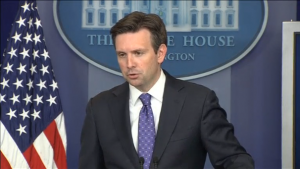
JULY 14 (Reuters) — U.S.-led forces stepped up air operations in Iraq against Islamic State positions, with 29 of 39 air strikes in the country on Sunday (July 13) coming near the Anbar provincial capital Ramadi, the Combined Joint Task Force and White House said on Monday.
White House spokesman Josh Earnest said the increased air strikes are a sign of the growth of the Iraq security forces and the ongoing coordination between the Iraq military and the United States.
“Those forces that are operating under the command and control of the Iraqi central government can expect to have the support of the United States and our coalition partners as they undertake these operations,” Earnest said.
There also were nine air strikes in Syria targeting Islamic State forces with bomber, fighter-attack and drone aircraft, seven coming near Al Hasakah and one each near Raqqah and Kobani, according to the statement released by the Combined Joint Task Force, which is leading the air operations.
Iraqi troops and Shi’ite Muslim militia forces attacked Islamic State fighters on several fronts on Monday in Anbar province at the start of what is likely to be a long and fiercely contested offensive.
With air strikes increasing to combat Islamic State forces in Iraq and Syria, the White House said they are concerned about the growing threat from extremists operating in Libya.
“We are seeing and we have seen a concerted effort by some extremists in Libya to capitalize on the chaos in that country, to establish a foothold to carry out extremist acts of violence not just in Libya but even in some surrounding countries,” Earnest said.
The White House said the United States is working on coordinating both security and intelligence matters with countries in North Africa to address the increased security threats.







